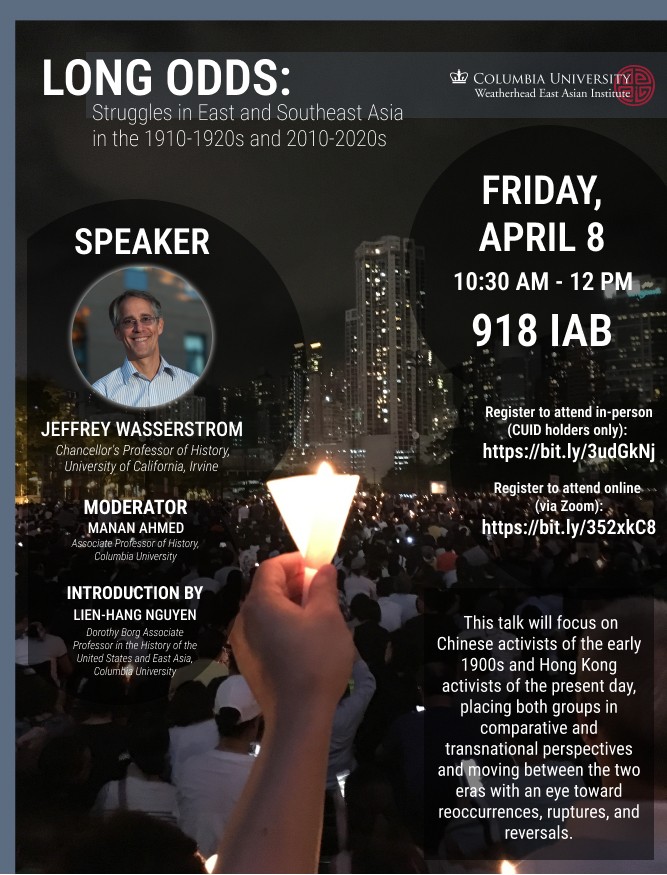april, 2022
Event Details
Long Odds Struggles in East and Southeast Asia, the 1910-1920s and 2010-2020s
Event Details
Long Odds Struggles in East and Southeast Asia, the 1910-1920s and 2010-2020s

Registration:
- To register to attend this event in-person, please register HERE. *CU ID holders only
- To register to attend this event online, please register HERE.
Speaker: Jeffrey Wasserstrom, Chancellor’s Professor of History at the University of California, Irvine
Introduction by: Lien-Hang Nguyen, Dorothy Borg Associate Professor in the History of the United States and East Asia
Moderated by: Manan Ahmed, Associate Professor of history at Columbia University
During the first decades of the last century, activists with ties to various parts of Asia embraced and then discarded different ideologies and found varying ways to connect with one another, sometimes in exile. What linked them were some shared grievances, such as a dislike of the way their community was being bullied or controlled by people in a distant capital and of the limits on their freedom to speak out on issues that concerned them and organize to bring about change. We have been seeing something similar in some ways but different in others take place now, as activists in and exiles from Hong Kong, Thailand and Burma take part in what is sometimes called “Milk Tea Alliance” struggles. There are obvious contrasts: importance of online connections now is novel; the Chinese state was a weak force a century ago, but is a strong one today; Vietnamese activists were a more central part of the earlier story than the current one; ties between South Asian and East Asian exiles were more notable a century ago; and there is no contemporary counterpart to the Comintern on the scene connecting radicals. And yet, this talk will argue, there are important echoes of the earlier period to be heard today, as well as much to learn about how different struggles in East and Southeast Asia influenced one another at other points in time, such as the 1980s. This talk will focus on Chinese activists of the early 1900s and Hong Kong ones now but place both groups in comparative and transnational perspectives, will move between the two eras with an eye toward reoccurrences, ruptures, and reversals.
Jeffrey Wasserstrom is Chancellor’s Professor of History at the University of California, Irvine, where he also holds courtesy appointments in the Law School and in the Literary Journalism Program. He has written, co-written, edited, or co-edited a dozen books, the most recent of which are Vigil: Hong Kong on the Brink (Columbia Global Reports, 2020), which he wrote, and The Oxford History of Modern China (2022), which he edited. In addition to contributing to academic journals, he often writes for newspapers (including the Wall Street Journal and the New York Times), magazines (such as the Atlantic), and literary reviews (e.g., the TLS and the Los Angeles Review of Books).
Manan Ahmed is a specialist in South Asia. He is an executive editor for the Journal of the History of Ideas and the author of works such as A Book of Conquest: Chachnama and Muslim Origins in South Asia (Harvard University Press, 2016) and The Loss of Hindustan: The Invention of India (Harvard University Press, 2020), a book that was shortlisted for the Cundill History Prize in 2021.
This event is sponsored by the Weatherhead East Asian Institute.
Contact Information
Time
(Friday) 10:30 am - 11:00 pm
Location
School of International and Public Affairs, 420 West 118th Street, Room 918, New York, NY 10027
